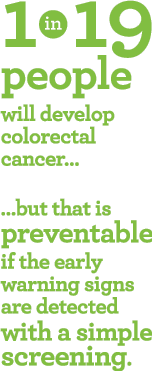Colonoscopies Save Lives
For years, the healthcare community has known that colonoscopies reduce the incidence of colon and rectal cancer. Colorectal cancer is one of the few cancers that can be prevented by regular screening, yet it is the second most common cause of cancer-related death in the United States. Fewer than 60% of the Americans over the age of 50 have had a screening colonoscopy or sigmoidoscopy in the past 10 years.
 A colonoscopy is a procedure where a gastroenterologist uses a flexible, lighted tube (colonoscope) to look at the interior walls of the rectum and the entire colon. During this procedure, samples of tissue may be collected for closer examination, or polyps may be removed. Colonoscopies can be used as screening tests or as follow-up diagnostic tools when the results of another screening test are positive. Colonoscopy is also used as a diagnostic test when a person has symptoms, and it can be used as a follow-up test when the results of another colorectal cancer screening test are unclear or abnormal.
A colonoscopy is a procedure where a gastroenterologist uses a flexible, lighted tube (colonoscope) to look at the interior walls of the rectum and the entire colon. During this procedure, samples of tissue may be collected for closer examination, or polyps may be removed. Colonoscopies can be used as screening tests or as follow-up diagnostic tools when the results of another screening test are positive. Colonoscopy is also used as a diagnostic test when a person has symptoms, and it can be used as a follow-up test when the results of another colorectal cancer screening test are unclear or abnormal.
Individuals with no family or personal history of colon cancer should have a screening colonoscopy when they reach the age of 50. If a polyp is found in the initial screening, a second colonoscopy is recommended in one to five years depending on the doctor’s discretion. If there is a family history of colon cancer, the initial screening should occur by age 40 or 10 years earlier than the age when the family member developed cancer whichever is younger.
Colonoscopy preparation requires colon-cleansing, and nourishment during prep is usually limited to clear liquids, gelatin, clear broth or black coffee. Recent advances in the preparation have allowed patients to eat a restricted diet the day before you procedure.
Although we can’t change our genetic makeup or reduce all the health risks we face, it makes sense to commit to regular colon screenings. A colonoscopy can save your life. Get screened!
